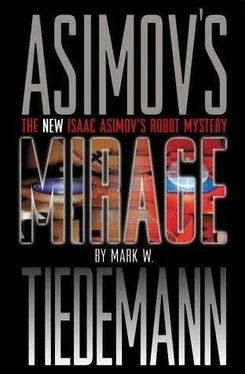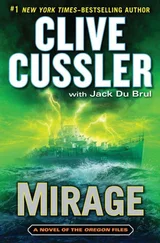Mark Tiedemann - Mirage
Здесь есть возможность читать онлайн «Mark Tiedemann - Mirage» весь текст электронной книги совершенно бесплатно (целиком полную версию без сокращений). В некоторых случаях можно слушать аудио, скачать через торрент в формате fb2 и присутствует краткое содержание. Год выпуска: 2000, ISBN: 2000, Издательство: IBooks, Жанр: Фантастика и фэнтези, на английском языке. Описание произведения, (предисловие) а так же отзывы посетителей доступны на портале библиотеки ЛибКат.
- Название:Mirage
- Автор:
- Издательство:IBooks
- Жанр:
- Год:2000
- ISBN:ISBN: 0-671-03910-5
- Рейтинг книги:5 / 5. Голосов: 1
-
Избранное:Добавить в избранное
- Отзывы:
-
Ваша оценка:
- 100
- 1
- 2
- 3
- 4
- 5
Mirage: краткое содержание, описание и аннотация
Предлагаем к чтению аннотацию, описание, краткое содержание или предисловие (зависит от того, что написал сам автор книги «Mirage»). Если вы не нашли необходимую информацию о книге — напишите в комментариях, мы постараемся отыскать её.
Mirage — читать онлайн бесплатно полную книгу (весь текст) целиком
Ниже представлен текст книги, разбитый по страницам. Система сохранения места последней прочитанной страницы, позволяет с удобством читать онлайн бесплатно книгу «Mirage», без необходимости каждый раз заново искать на чём Вы остановились. Поставьте закладку, и сможете в любой момент перейти на страницу, на которой закончили чтение.
Интервал:
Закладка:
Mikels filled a tall glass from a crystal pitcher and handed it to Derec. He poured for himself a tumbler of brandy from an ornate decanter. Every move exuded a kind of pride: look what I have.
"Your original call concerned Union Station," he said, lifting the tumbler in a half salute. He sipped.
"Phylaxis Group was supposed to have the exclusive service contract on the RI. I was concerned that everything be handled the best way possible. And Phylaxis was able to get operations back online within hours. We were running all the operations before we were excluded. I'm curious-"
"You're curious if we had anything to do with shoving you out of the way." Mikels shrugged. "Depends how you look at it, Mr. Avery. We'd been lobbying to displace positronics in Union Station since the proposal to go that way first came up. Now, I understand as well as you that having positronics there was political, not practical, so our lobbying was directed at those people in government responsible for deciding such things. Good business. When it failed, Imbitek wanted to be able to take advantage of it."
"You were certain it would fail. That's why you convinced Senator Eliton to write you into the contract two years ago, so you could step in at once."
Mikels looked momentarily surprised. He smiled. "We'd already warned the Senate that positronics would not work there and that when it went wrong it would go very wrong, either technically or politically." He frowned. "We had no idea it would be this costly."
"You don't blame positronics for Eliton's death, do you?"
"Being a non-Terran yourself, perhaps you wouldn't understand. Yes, indirectly or otherwise. Without positronics-the issue and the fact-Eliton would never have made himself a target."
Derec was surprised at Mikels' bluntness. He stared at the man, wondering what would follow such an observation.
Mikels smiled again. "But that's politics. No one does it successfully without making enemies, and Clar was very successful."
"I suppose it's also difficult losing a friend this way."
Mikels blinked at him. "I knew Clar, certainly. We were as close to being friends as two people in our positions can be. We had lunch at least once a week. He was the main target of our lobbying efforts." He finished his brandy and poured another. "He'll be missed."
The words came out flat, empty of emotion. A mistake, Derec realized.
"So, how can I help you now, Mr. Avery?"
"Can you get me inside Union Station to look at what you're doing?"
Mikels looked surprised for a moment, then laughed. "What do you need me to do that for?"
"I've been barred by Special Service."
"In that case, why would I risk their displeasure to help you?"
Derec shrugged. "Just a thought. You asked." He drank his water and set the glass down, half-finished. "Who do you think engineered the assassinations?"
"Fanatics. Zealots. Patriots."
"Former employees?"
"And why would you say that?" Mikels asked.
"You aren't the only one with lobbying interests, Mr. Mikels."
Mikels nodded as if he had just had something confirmed.
"Since you're here, Mr. Avery, can I offer you a tour? Do you know much about imbedded technology?"
"Honestly, no, I don't."
"Well, let me show you. I think you'll find it amazing."
Mikels crossed to his desk and leaned over it. He spoke briefly, his words indistinct to Derec, then smiled and gestured for Derec to follow.
Derec's scalp tingled. I should leave now, he thought.
Instead, he let Alda Mikels take him by the elbow and lead him into his empire. "This," Mikels declared, one arm outstretched, as they stepped out of a transport cubicle, "is our bench test lab. One of them, anyway."
Derec slowed as he approached the enormous window that ran the length of the oversized hallway. Beyond stretched a maze of tables laden with equipment, tended by dozens of people in pristine white coveralls, working under shadowless light. It dazzled; he found it difficult to focus on anyone point, all of it fascinated him. No sound came through the glass.
"I understand your main manufacturing facilities are elsewhere," Derec said, as much to break the long stillness as anything.
"Our largest factory is in Kiev, but it's not much larger than the ones in Denver and Singapore. R and D happens here, and we build the prototypes. There's some jobshopping that gets done as well-special requests, custom-fitted pieces, things like that."
This was what Aurora and Solaria had hoped to obtain from the new treaty, Derec knew-the methodology to do manufacturing on such a scale. The Fifty Worlds were wonderful places and their tech was awesome in many respects, but in a way they were simple tinkerers compared to Earth. Here, humans knew how to create places where tools and machines could be made in the millions. The ability to do so, to conceive of the techniques and construct the mechanisms, both human and machine, to produce in those quantities was an art that somehow had never made the transition from Earth to the stars. Aurora built excellent robots, but in small lots of a hundred or less. If Earth decided to build them they could flood the trade lanes with absolutely identical models by the tens and hundreds of thousands. Spacer tech was "handmade" compared to the mass manufacturing culture of Earth.
Current trade law forbade the exportation of key technologies. It gave Earth an edge. Even black marketeers would be inclined to want it to stay that way. Their profit came from inequities in systems.
"I didn't realize the need to do new research was so important," Derec said. "I mean, the basic design of a positronic brain has remained largely unchanged for-"
"And the culture stagnates, doesn't it?" Mikels interjected. "Nothing new, nothing grows. Why change perfection? But perfection is only real for a given time, place, and person. Tomorrow, it's not perfect anymore, is it? And usually never for your neighbor." He smiled at Derec, enjoying himself. "But don't take offense. The basic idea of imbedded tech hasn't changed for almost as long. I like to think it began with burnt toast."
"Pardon me?"
"Way back when, people had to toast their bread over an open fire. Lay the slices on a plate, suspend it over a flame, and watch it so they could turn it at the right time. Too little time, it was just warm bread. Too much and it was blackened grit. Had to be a better way. So someone devises a box with heating coils and a thermostat attached to a springlock that retracts when enough heat has been applied. The box knows exactly how much heat is necessary and toasts the bread the same way every time. Imbedded tech. Since then, if people want something done and they don't want to tend to it with one hundred percent of their attention, someone else has found a way to make a device that will do it for them. It finally got so sophisticated that some of these devices are the intellectual equivalent of small children. Then they got so that they weren't even visible and hardly ever broke. Paradise."
"Perfection?" Derec chided.
"Not at all. People change, needs change, technology has to keep up. Take that toaster. It's so good now that it even makes the bread, assembling molecules in just the right way and shaping the result before heating it. But what if you also want it to make sweet bread? Or cake? It doesn't have the programming for that and the device simply isn't important enough-or expensive enough-to warrant having a reprogrammable feature. What do you do?"
"Throw it out and buy a better model. "
"Wasteful. But we've gotten around it." Mikels waved at the lab. "Penetrating polycollates."
"I'm not familiar with the term."
"Not many are. We can introduce augmentation through the surface of the device, reprogram it the same way a virus reprograms a healthy cell. It's a complex filtration system that can work its way through the interstices of a material"
Читать дальшеИнтервал:
Закладка:
Похожие книги на «Mirage»
Представляем Вашему вниманию похожие книги на «Mirage» списком для выбора. Мы отобрали схожую по названию и смыслу литературу в надежде предоставить читателям больше вариантов отыскать новые, интересные, ещё непрочитанные произведения.
Обсуждение, отзывы о книге «Mirage» и просто собственные мнения читателей. Оставьте ваши комментарии, напишите, что Вы думаете о произведении, его смысле или главных героях. Укажите что конкретно понравилось, а что нет, и почему Вы так считаете.












